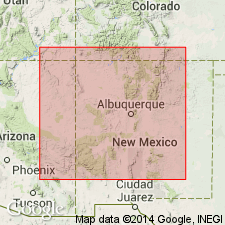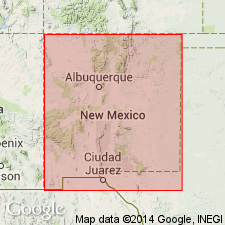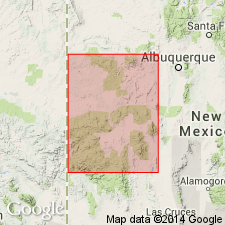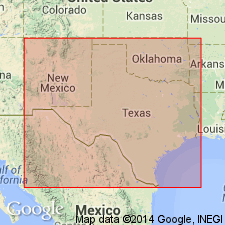
- Usage in publication:
-
- Atarque member
- Modifications:
-
- Original reference
- Dominant lithology:
-
- Sandstone
- Shale
- AAPG geologic province:
-
- San Juan basin
Summary:
Pg. 11, 35, 60, pl. 12. Atarque member of Mesaverde formation. Nonmarine deposit composed of sandstones, shales, carbonaceous shales, and thin seams of coal. Thickness about 127 feet. Lowest Mesaverde in area. Underlies Horsehead tongue (new) of Mancos shale. Age is Late Cretaceous.
Occurs near village of Atarque, Valencia Co., northwestern NM, and also in Zuni Indian Reservation, McKinley Co., northwestern NM.
Source: US geologic names lexicon (USGS Bull. 1200, p. 159).

- Usage in publication:
-
- Atarque Sandstone Member*
- Modifications:
-
- Revised
- Reference
- Dominant lithology:
-
- Sandstone
- AAPG geologic province:
-
- Orogrande basin
- San Juan basin
- Basin-and-Range province
Summary:
Removed from Gallup Sandstone. Designated basal member and restricted to the lower sandstone of the Tres Hermanos Formation (raised in stratigraphic rank) in Orogrande basin. Principal reference section designated (exposures near type are poor) and measured at NW1/4 NE1/4 sec 5, T10N, R17W, McKinley Co, NM, San Juan basin. Recognized as a member at D-Cross Mountain, Catron Co, Basin-and-Range province, and east to Carthage, Socorro Co, Orogrande basin. Is a buff, very fine to fine-grained sandstone 58 ft (17.6 m) thick at principal reference section. Sandstone beds may be flat bedded, massive, low angle cross bedded, and fossiliferous. Ranges from as little as 8 ft to almost 100 ft. Three reference sections measured. Overlies and intertongues with Rio Salado Tongue (named) of Mancos Shale; underlies Carthage Member (new) of Tres Hermanos. Is a regressive coastal-barrier sandstone or shoreface complex that prograded north-eastward into Mancos sea. Was a low-energy shoreline. Is probably equivalent to Semilla Sandstone Member of Mancos. Is of late early to early middle Turonian (Late Cretaceous) age.
Source: GNU records (USGS DDS-6; Denver GNULEX).

- Usage in publication:
-
- Atarque Sandstone*
- Modifications:
-
- Revised
- Reference
- AAPG geologic province:
-
- San Juan basin
- Basin-and-Range province
Summary:
Raised in stratigraphic rank to Atarque Sandstone in Salt Lake coal field, southeast Cibola and northwest Catron Cos, NM in San Juan basin and Basin-and-Range province. Reference section measured on southwest side Santa Rita Mesa, SW1/4 sec 7, T4N, R18W. Is composed of grayish-orange, very fine to fine-grained, flat bedded sandstone with some interbedded light gray to olive-gray shales that total 97.9 ft thick at reference section. Base placed at base of lowest, very fine grained, flat bedded sandstone above gray, slightly micaceous shale interbedded with gray siltstone and sandstone of Rio Salado Tongue of Mancos Shale. Top placed at top of uppermost flat bedded to low angle, cross-bedded, usually burrowed sandstone with dusky-brown carbonaceous shale of Moreno Hill Formation (new). Is a shallow water to brackish-water marine unit. Is fossiliferous (pelecypods, plesiosaur vertebra). Assigned to middle Turonian, or Late Cretaceous. These rocks were assigned to Mesaverde Formation in earlier reports.
Source: GNU records (USGS DDS-6; Denver GNULEX).

- Usage in publication:
-
- Atarque Sandstone Member*
- Modifications:
-
- Biostratigraphic dating
- AAPG geologic province:
-
- Orogrande basin
Summary:
Is basal member of Tres Hermanos Formation in Socorro Co, NM in Orogrande basin. Basal part of member is assigned a middle Turonian (Late Cretaceous) age based on presence of the ammonite SPATHITES RIOENSIS in collections from USGS Mesozoic localities D9154, D10240, D10241, D10244, and D10465.
Source: GNU records (USGS DDS-6; Denver GNULEX).
For more information, please contact Nancy Stamm, Geologic Names Committee Secretary.
Asterisk (*) indicates published by U.S. Geological Survey authors.
"No current usage" (†) implies that a name has been abandoned or has fallen into disuse. Former usage and, if known, replacement name given in parentheses ( ).
Slash (/) indicates name conflicts with nomenclatural guidelines (CSN, 1933; ACSN, 1961, 1970; NACSN, 1983, 2005, 2021). May be explained within brackets ([ ]).

